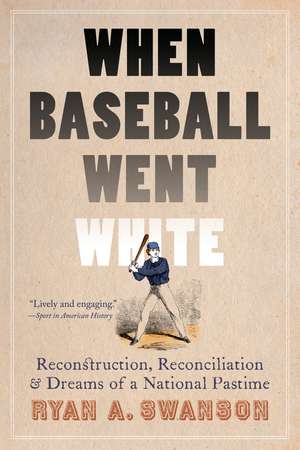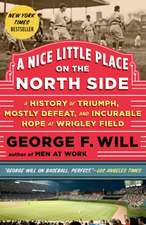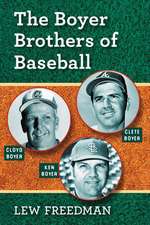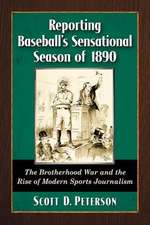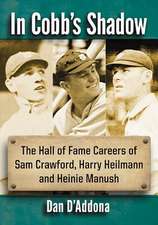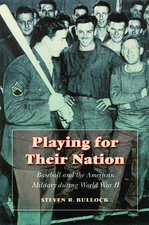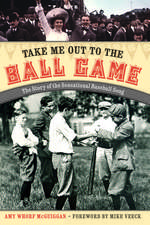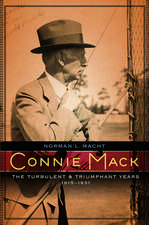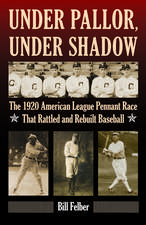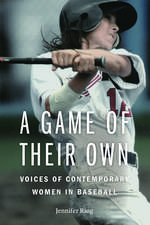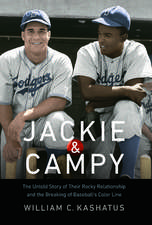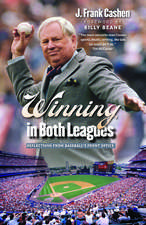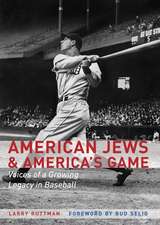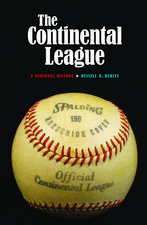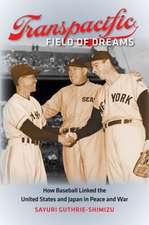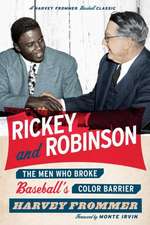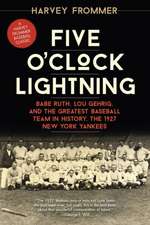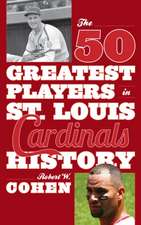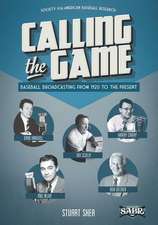When Baseball Went White: Reconstruction, Reconciliation, and Dreams of a National Pastime
Autor Ryan A. Swansonen Limba Engleză Paperback – 31 mar 2020
The story of Jackie Robinson valiantly breaking baseball’s color barrier in 1947 is one most Americans know. But less recognized is the fact that some seventy years earlier, following the Civil War, baseball was tenuously biracial and had the potential for a truly open game. How, then, did the game become so firmly segregated that it required a trailblazer like Robinson? The answer, Ryan A. Swanson suggests, has everything to do with the politics of “reconciliation” and a wish to avoid the issues of race that an integrated game necessarily raised.
The history of baseball during Reconstruction, as Swanson tells it, is a story of lost opportunities. Thomas Fitzgerald and Octavius Catto (a Philadelphia baseball tandem), for example, were poised to emerge as pioneers of integration in the 1860s. Instead, the desire to create a “national game”—professional and appealing to white northerners and southerners alike—trumped any movement toward civil rights. Focusing on Philadelphia, Washington DC, and Richmond—three cities with large Black populations and thriving baseball clubs—Swanson uncovers the origins of baseball’s segregation and the mechanics of its implementation.
An important piece of sports history, his work also offers a better understanding of Reconstruction, race, and segregation in America.
The history of baseball during Reconstruction, as Swanson tells it, is a story of lost opportunities. Thomas Fitzgerald and Octavius Catto (a Philadelphia baseball tandem), for example, were poised to emerge as pioneers of integration in the 1860s. Instead, the desire to create a “national game”—professional and appealing to white northerners and southerners alike—trumped any movement toward civil rights. Focusing on Philadelphia, Washington DC, and Richmond—three cities with large Black populations and thriving baseball clubs—Swanson uncovers the origins of baseball’s segregation and the mechanics of its implementation.
An important piece of sports history, his work also offers a better understanding of Reconstruction, race, and segregation in America.
| Toate formatele și edițiile | Preț | Express |
|---|---|---|
| Paperback (1) | 113.00 lei 3-5 săpt. | |
| Nebraska – 31 mar 2020 | 113.00 lei 3-5 săpt. | |
| Hardback (1) | 203.66 lei 3-5 săpt. | |
| Nebraska – iun 2014 | 203.66 lei 3-5 săpt. |
Preț: 113.00 lei
Nou
Puncte Express: 170
Preț estimativ în valută:
21.62€ • 23.12$ • 18.03£
21.62€ • 23.12$ • 18.03£
Carte disponibilă
Livrare economică 27 martie-10 aprilie
Preluare comenzi: 021 569.72.76
Specificații
ISBN-13: 9781496219534
ISBN-10: 1496219538
Pagini: 276
Ilustrații: 1 illustration, 3 maps, index
Dimensiuni: 152 x 229 x 18 mm
Greutate: 0.4 kg
Editura: Nebraska
Colecția University of Nebraska Press
Locul publicării:United States
ISBN-10: 1496219538
Pagini: 276
Ilustrații: 1 illustration, 3 maps, index
Dimensiuni: 152 x 229 x 18 mm
Greutate: 0.4 kg
Editura: Nebraska
Colecția University of Nebraska Press
Locul publicării:United States
Notă biografică
Ryan A. Swanson is an associate professor and the director of the Lobo Scholars Program in the Honors College at the University of New Mexico. He is the author of The Strenuous Life: Theodore Roosevelt and the Making of the American Athlete.
Cuprins
List of Illustrations
Introduction
Prominent Players and Clubs
Part 1. The War’s Over, 1865–67
1. Washington DC: A Game to Be Governed
2. Richmond: Make It a Southern Game
3. Philadelphia: Baseball’s Boomtown
Part 2. Sorting Out New Divisions, 1867–69
4. Philadelphia: Setting Precedent
5. Washington DC: Nationalizing Separation
6. Richmond: Calibrating a Response
Part 3. New Realities Entrenched, the 1870s
7. Philadelphia: Permanent Solutions
8. Richmond: The Final Tally
9. Washington DC: Professional Separation
Epilogue
Acknowledgments
Notes
Bibliography
Index
Recenzii
"A boon to scholars of both the early development of baseball and race relations after the Civil War."—Library Journal
"When Baseball Went White is an intriguing, insightful, and provocative book that opens exciting possibilities for future researchers."—David Welky, Journal of Sport History
"Lively and engaging."—Dain Tepoel, Sport in American History
“Ryan Swanson's carefully researched and wonderfully nuanced study of baseball’s declining race relations during Reconstruction sheds considerable light on this oft-neglected topic. A must-read.”—Peter Morris, author of A Game of Inches and Level Playing Fields
“Deeply researched and well written, Ryan A. Swanson’s When Baseball Went White carefully examines ‘the mechanics of segregation’ that racially cleansed organized baseball during Reconstruction and in the process helped the game become our ‘national pastime,’ at the expense of civil rights and racial justice. Swanson reveals, in fine detail, how a sport that would become a truly meaningful cultural practice and institution nevertheless became something less than it might have been.”—Daniel A. Nathan, president of the North American Society for Sport History and author of Saying It’s So: A Cultural History of the Black Sox Scandal
Descriere
In the decade after the Civil War, baseball became segregated because its leaders wanted to grow its presence and appeal to Southerners and to professionalize the sport. As a result, Black players were excluded until 1947.
